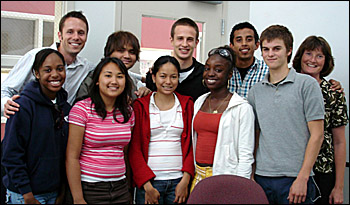 |
 |
 |
 | |||
|
The Evolution of Science
We asked whether any of them had been uncomfortable with the use of the Bible in class. "I'm personally not a very religious person," said one boy. "I wasn't necessarily averse to using the Bible. I found it was very hard to place that much validity in one resource." "Before, I never really questioned too much about my faith," said a girl, "but in this project, I was able to look at the more scientific sides of my faith, and also understand more about evolution and say, 'Well that kind of makes sense, too,' and I can see where they're coming from." "Probably my greatest question is, 'Who's right?'" asked another boy. "Some people devote a great portion of their lives such as the creationists boasting their views to questions that essentially no one can really answer at this time." Did anyone change their mind about anything? "It didn't change my mind about my beliefs," said one girl, "but it made me more open to other possibilities and not just close myself off to listen to something that I don't believe in but to listen to the evidence behind both sides." There was universal agreement on this issue. These students at High Tech High had all come away from their lesson in evolution with the same personal beliefs that they held when it began. Phillip Johnson holds this school up as an example of success, but it would hardly satisfy most supporters of intelligent design. They want intelligent design taught in science class, not in humanities as another creation myth. And that's what Eugenie Scott of the National Center for Science Education can't tolerate. "If your goal is to teach science," says Scott, "then these kinds of creation or evolution comparisons don't get the job done. The creationism part of the study is pretty much a waste of time because the science is so bad. Why fill kids up with bad science? There's little enough time to teach science. Why waste it?" Yet Phillip Johnson is equally firm in his belief about the benefits of opening up the discussion. Intelligent design or evidence against evolution, he believes, can be constructively debated. "I was always prepared, by the way, to lose the debate," says Johnson. "But I said this has to be a legitimate question. Do you need intelligence to make life or don't you need intelligence? That to me is the neutral position and the scientific position. It seems to me, they're the ones applying a religious dogma to the issue." But will there ever be a loser or a winner in this debate? William Jennings Bryan made a prediction at the conclusion of the Scopes trial in 1925. "This cause has stirred the world," said Bryan. "It is because it goes deep. It is because it extends wide and because it reaches into the future beyond the power of man to see. Here has been fought out a little case of little consequence as a case. But the world is interested because it raises an issue, and that issue will some day be settled right, whether it is settled on our side or the other side. It is going to be settled right." Eighty years later, William Jennings Bryan might admit that he was wrong. This issue is still far from settled and is perhaps, only getting more impassioned. The theory of intelligent design does not resolve the conflict many people see between religion and science. Instead, it fans the coals of a fire that has never really gone out in the years since Darwin first published his theory. The debate over intelligent design shows faith and science still locked in conflict, a conflict fought in America's courts, legislatures, and schools, with no sign of resolution.
Back to Intelligent Designs on Evolution | |||||
 | |||||
